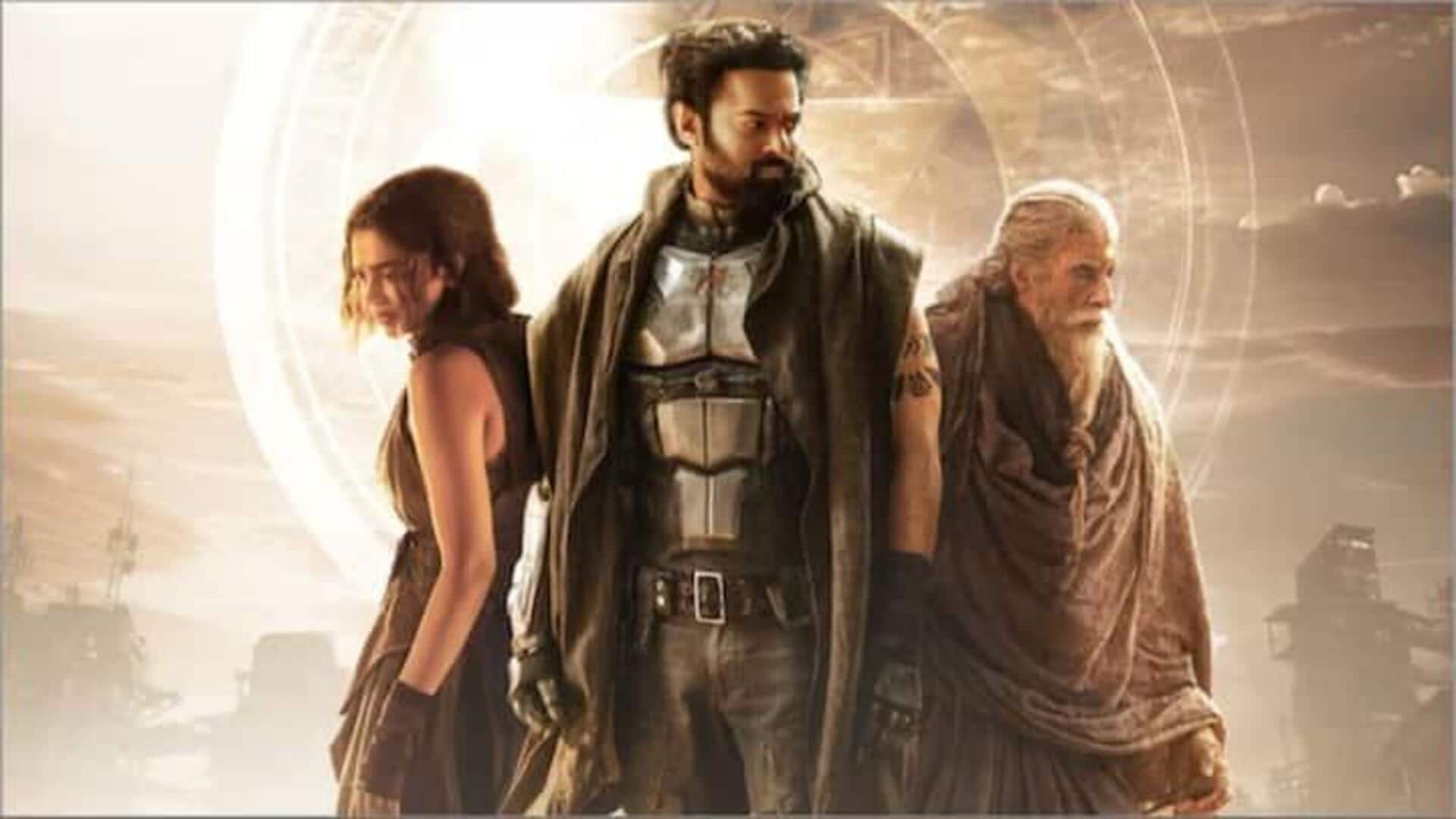
'Kalki' review: Spectacular world-building, yet leaves much to be desired
What's the story
Kalki 2898 AD, where dystopia meets Hindu mythology meets sci-fi, is a curious case. It's tough to resist its appeal since it has culturally rich, centuries-old stories at the forefront of it, but the film possibly looked stronger on paper than on screen. It has one of the most bothersome first halves I've ever seen, followed by a climax that made my jaw drop.
Story
The premise of 'Kalki 2898 AD'
The film, set 6,000 years after the Mahabharata War (in Kalyug), showcases the collapse of all structures and humanity. Pregnant women are hard to come by, so when Sum-80 (Deepika Padukone) conceives, she is on the radar of Yaskin, the god of this dystopian world. But, she finds a savior in Ashwatthama (Amitabh Bachchan), who believes she is carrying Kalki, Lord Vishnu's final avatar.
#1
Prabhas is tasked with finding Sum-80
Prabhas essays Bhairava, a bounty hunter who wishes to collect a million units (a form of currency) to live in the Complex, where all the people who work for Yaskin (Kamal Haasan) reside. He spends most of the runtime looking for Sum-80, so that he can seal his place in the Complex once and for all. Bhairava, of course, is another name for Shiva.
#2
Background and the context of the story
Kalki demands you do your homework before you step into the theater. The film opens with a shot from the last days of the Mahabharata war when Lord Krishna cursed Ashwatthama with immortality. Sum-80 is a reference to Sumati (believed to be Kalki's mother) and Shambala, where refugees live, refers to the namesake city where Lord Kalki is prophesized to be born.
#3
Off to a great start, then everything fizzles away
The first few scenes have the best example of de-aging I have ever seen, and it's spectacular how Bachchan is portrayed as the invincible warrior who fought in the Kurukshetra War. However, the film immediately hits a snag once these Mahabharata sequences are over, and most of the first-half is annoying, exasperating, with numerous scenes that do nothing but lengthen this three-hour-long movie.
#4
Disha Patani's role adds nothing to the film
If you have a preconceived notion about Disha Patani's role, you're on the right track. Kicks, punches, a couple of dialogues I couldn't care less for, and then, out of nowhere, a full-fledged romance-dance sequence with Prabhas. So, from Nag Ashwin's world, we immediately and painfully abruptly jump to Karan Johar's world, with a rom-comish scene that looks straight out of the Met Gala.
#5
Several scenes fall flat and invoke no emotions
The aforementioned part is so ludicrous that you have to see it to believe it, and it seems like Kalki only chooses to share limited information with us, concealing more than it reveals. This lack of a story (overcompensated by the action pieces) drives a stake through the movie's heart. The film feels overstuffed and, for many minutes, a sense of nothingness takes over.
#6
Why does it have such a forgettable soundtrack?
While Kalki is letdown by its inability to showcase drama and emotions, its potential and chances of success are also greatly undercut by its lack of a good soundtrack. Take, for instance, how Pritam's exceptional soundtrack bolstered an imperfect Brahmastra. If only the movie had shifted its attention to that aspect, this would have elevated the scenes a lot better, especially in the climax.
#7
Now, about the good parts
When movies suffer from the second-half syndrome, they build momentum pre-intermission and then get down to their knees in the second. With Kalki, things are the exact opposite. Post-interval, you will be soaked into an excellent, unparalleled second half that will stay with you for hours, perhaps days. A triumph of filmmaking with magnificent visual effects that take you 6,000 years back.
#8
Cannot get enough of the 'Mahabharata' visuals
At almost all points, Kalki is pregnant with possibilities (which will hopefully be mined in the sequel). It packs a punch with its surprise cameos and its final twist, which you'll not see coming. The Mahabharata visuals are accentuated by 3D, the meta humor is sharp and self-aware, and the world-building is spectacular even in places where the film is not at its best.
#9
More on the above point and the climax
When the climax began playing, I was completely immersed in the film, so much so that despite its three-hour-long length, it did not feel crushing, which is not something you can say for most movies. So much happens in the last few minutes that it's impossible to take your eyes off the screen, and if you do, you're at the risk of missing out!
#10
Come for Prabhas, stay for Bachchan
Minor spoiler, but Haasan only has a special appearance. The film, instead, is carried on his shoulders by Bachchan, who is both in the first and the last frame. It is some sort of poetic justice to see him essay such a towering figure of mythology; it befits his own stature as a towering figure of Indian cinema. A behemothic role for a giant.
Verdict
Far from perfect, but not unwatchable; 3/5 stars
While the film certainly feels naked at times because of the lack of events (it feels like the same sequences repeat), it's tough not to be impressed by Ashwin's vision, brought to life by DNEG's otherwordly visuals. For all its flaws, however, I would still recommend watching it on the big screen, because this is the best depiction of Mahabharata you'll ever see.